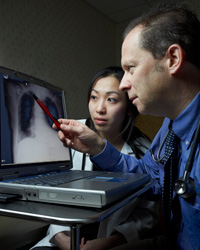The Student Continuity Practice University of Connecticut
Feature Story
Health Center Today, June 14, 2010
Student Continuity Practice Turns 15
By Noreen Kirk

Medical student Yvonne Chu and Dr. Joseph Babiarz.
Photo by Lanny Nagler
In 1995 the University of Connecticut School of Medicine became the first medical school in the country to provide students with a unique learning experience: working side-by-side with a community-based primary care physician for a half-day each week during the first three years of medical school. Today, the Student Continuity Practice (SCP) is going strong and remains a model of its kind.
"Since it was implemented, a number of schools have tried to emulate the experience, but even today I know of no experience that is as extensive," says Dr. Bruce Koeppen, the school�s dean of academic affairs and education, who was instrumental in creating the program.
Matching Students to Preceptors
Every student participates in SCP, which is part of the curriculum�s Clinical Medical Course. Participation is mandatory during the first three years, and students can elect SCP during the fourth year. This year, about 270 students are involved in SCP, and 231 community physicians at 167 sites are serving as preceptors.
During the summer before the student�s first year. SCP Director Karen Harrington interviews incoming students to get a sense of what they�re interested in. She then links each student with the preceptor who seems to be the best match.
"We�re lucky that so many of our preceptors participate year after year," says Harrington. "Many of them now have their fourth or fifth student. Some take multiple students. And some of our graduates who had SCP are back in the area and are now preceptors themselves."
Real-World Education
Dr. Lynn Kosowicz, director of the Clinical Medical Course and medical director of the SCP, says the program provides learning opportunities students just can�t get in a classroom setting. One of the most important is "to have experience with undifferentiated patients�with seeing patients and having to come up with a diagnosis. They get practice in using the clinical reasoning that goes with diagnosing a new problem."
The student works with the same preceptor for all three years, so he or she sees many of the same patients over time. This provides experience in building patient relationships and dealing with chronic illnesses. Eventually, students have their own panel of patients they see regularly.
The opportunity to observe experienced physicians and deal one-on-one with patients is "an invaluable learning tool," says second-year student Rishi Chugh, who works with Dr. Daniel Huber at Bolton Family & Sports Medicine. "It�s one thing to learn medicine in the classroom, but another thing entirely to practice in person."
Amy Amin is a fourth-year student who elected to continue SCP in the Meriden office of pediatrician Susan Lelko. "SCP is one of the most valuable experiences of the medical school curriculum," Amin says. "I�ve been able to integrate basic science with my experience in SCP and gain an appreciation for applying medical knowledge in a clinical setting."
Third-year student Molly Brady, who works with East Hartford internist Lillian Overman, has had several memorable moments during her SCP experience. One occurred as she was performing the basic neurologic exam she�d been taught in class. The exam revealed that the patient had lost half of her visual field. Dr. Overman immediately ordered follow-up testing, which revealed that the patient had a brain tumor. "It was so striking to me to see how helpful the skills we were learning could be," Brady says.
A Win for Everyone
Precepting physicians are as enthusiastic about the program as the students. Southington internist Joseph Babiarz says that the students are beneficial to him and his practice. �A student is a breath of fresh air,� Dr. Babiarz says. �They stimulate and challenge you, because you have to explain what you�re doing and justify it.� His patients appreciate the fact that the student can spend extra time with them, discussing issues such as diet, exercise and smoking cessation.
Internist Richard Wein of Wallingford, says, "I love to have students in the office. You get in the habit of doing things a certain way, and they make you think about things in a new way. And I like learning the basic science that they�re learning. It�s intellectually stimulating."
Dr. Wein notes that his patients are so fond of his current student, Mona Shahriari, they always ask about her when she�s not in the office. "All of us students are fortunate to have this program," Rishi Chugh says. "We�ll all be better physicians because of it."
westmagnstowiter1963.blogspot.com
Source: https://today.uchc.edu/features/2010/jun10/continuity.html
0 Response to "The Student Continuity Practice University of Connecticut"
Post a Comment